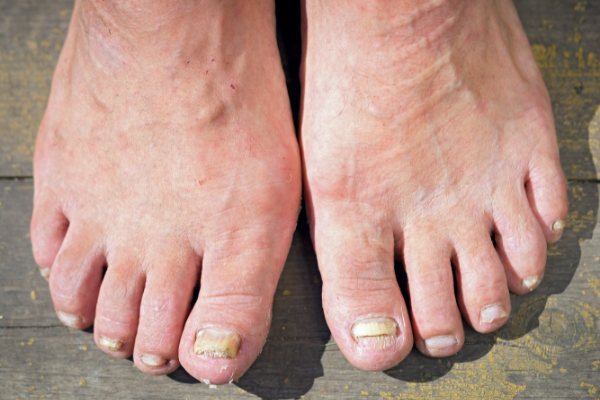About fungal nail infection
Many people develop a fungal nail infection at some point in their life. It's not usually serious, but can be unpleasant and difficult to treat.
The infection develops slowly and causes the nail to become discoloured, thickened and distorted.
Toenails are more frequently affected than the fingernails.
The medical name for a fungal nail infection is onychomycosis.
Signs and symptoms of a fungal nail infection
A fungal nail infection may not cause any obvious symptoms at first.
As it progresses, the infection can cause:
Sometimes the skin nearby may also become infected and be itchy and cracked or red and swollen.
How do you get a fungal nail infection?
Most fungal nail infections occur as a result of the fungi that cause athlete's foot infecting the nails.
These fungi often live harmlessly on your skin, but they can sometimes multiply and lead to infections. The fungi prefer warm, dark and moist places like the feet.
You're more likely to get a fungal nail infection if you:
Fungal nail infections can be spread to other people, so you should take steps to avoid this if you have an infection.
Treatments for fungal nail infections
Treatment isn't always needed for a mild fungal nail infection because it's unlikely to cause any further problems and you may feel it's not worth treating.
Whether you decide to have treatment or not, you should still practise good foot hygiene to stop the infection getting worse or spreading to others.
Speak to your podiatrist about possible treatments. These can include:
The treatment that we offer here is Clearanail which is micro drilling tiny holes into the infected nails so that a topical treatment can reach the source of infection.
The importance of treating the fungal load on your skin
Often you will have a mild chronic fungal infection in the skin as well as the nails. Therefore, it is important to treat the whole foot. A good antifungal skin treatment such as Lamisil used twice daily for 2 weeks. Shoe sanitising spray to get rid of the spores in your shoes and to not wear the same shoes every day. Wash your socks on as hot a wash as possible to kill any spores.
Preventing fungal nail infections
You can reduce your risk of developing a fungal nail infection by:
Nail salon equipment can sometimes be the source of fungal nail infections. If you regularly visit a salon, make sure any equipment used is properly sterilised between uses.
